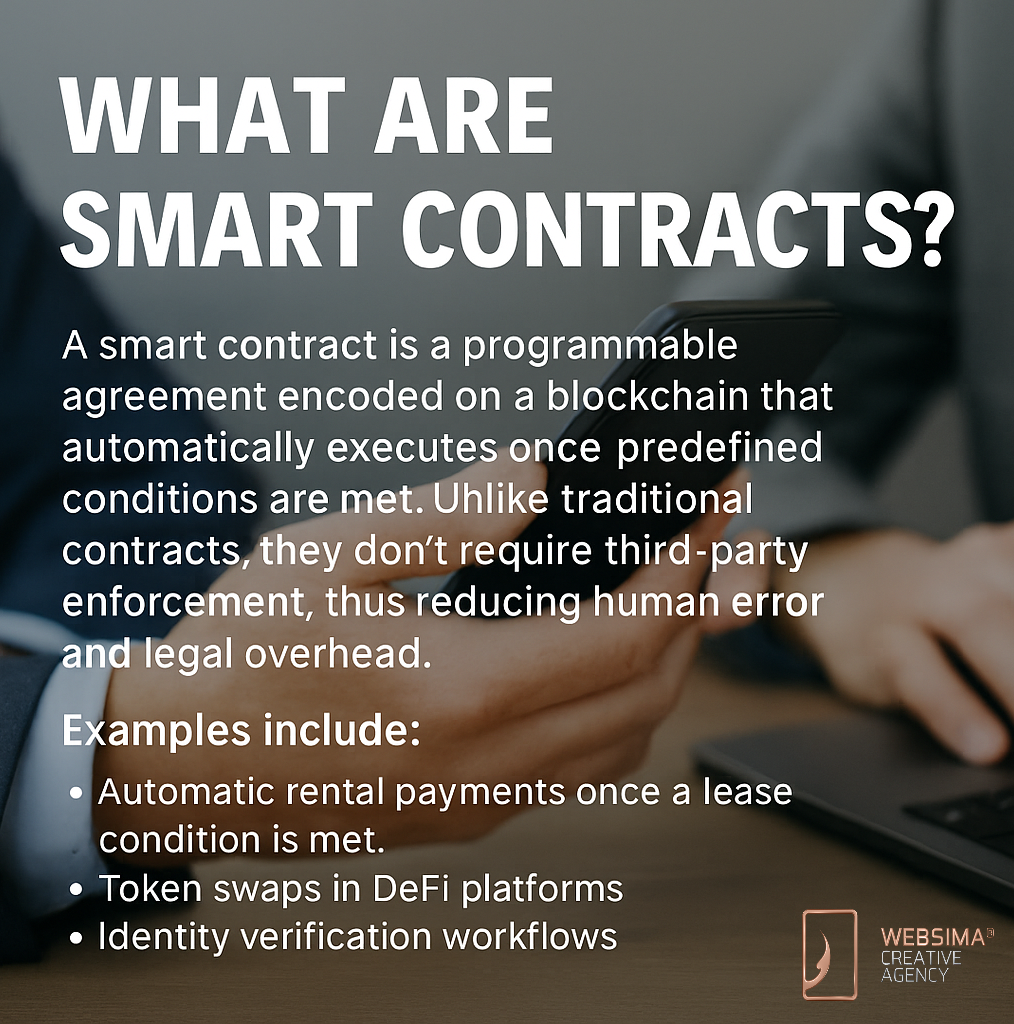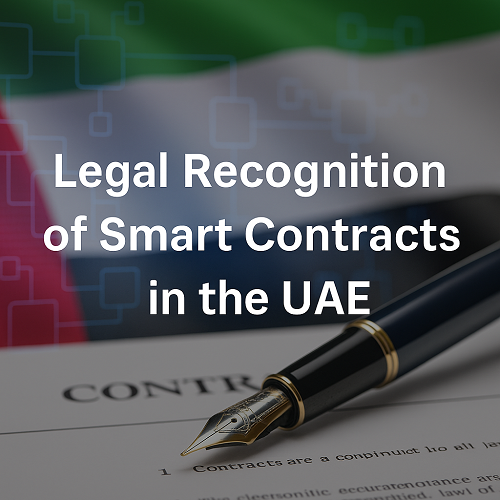Table of Contents
- Introduction
- What Are Smart Contracts?
- Legal Framework for Smart Contracts in the UAE
- Federal Decrees and UAE Civil Code Provisions
- Smart Contracts and DIFC Law
- Dubai’s Blockchain Strategy and Regulatory Support
- Smart Contracts in Practice: Use Cases in the UAE
- Challenges to Legal Enforcement
- Comparative Look: UAE vs. Global Legal Standards
- Conclusion
- Work with Websima: Blockchain Legal Strategy That Works
Introduction
As blockchain technology gains momentum globally, smart contracts are emerging as one of its most transformative applications. These digital agreements, which self-execute based on predefined conditions, promise to revolutionize industries by eliminating the need for intermediaries, reducing costs, and accelerating transaction speed. From smart contracts for real estate transactions in the UAE, tokenization and decentralized finance (DeFi) to automated supply chains and identity verification, smart contracts are redefining how trust and value are exchanged in the digital age. That’s why developing smart contracts focusing on a popular sector like real estate can be a top blockchain startup idea in Dubai and the UAE.
Ripple has secured regulatory approval from the Dubai Financial Services Authority (DFSA), making us the first blockchain payments provider licensed in the DIFC. https://t.co/6oHWtnjODr
This milestone unlocks fully regulated cross-border crypto payments in the UAE, bringing…
— Ripple (@Ripple) March 13, 2025
The UAE is aggressively embracing blockchain across public and private sectors, with initiatives like the Dubai Blockchain Strategy and the creation of VARA (Virtual Assets Regulatory Authority) signaling a strong commitment to digital transformation. Yet for developers, investors, and enterprises, the critical question remains: Are smart contracts legally enforceable in the UAE, and what conditions must be met for them to hold up in court?
This article takes a deep dive into the legal recognition of smart contracts in the UAE.
What Are Smart Contracts?
A smart contract is a programmable agreement encoded on a blockchain that automatically executes once predefined conditions are met. Unlike traditional contracts, they don’t require third-party enforcement, thus reducing human error and legal overhead.

Examples include:
- Automatic rental payments once a lease condition is met.
- Token swaps in DeFi platforms.
- Identity verification workflows.
Smart contracts are key to Web3 ecosystems, but their use raises legal questions—particularly in jurisdictions like the UAE where civil and common law frameworks coexist.
Smart Contracts Legal Recognition in the UAE
Federal Legislation
The UAE has taken a proactive stance toward digital transformation. The status of Smart contracts legal recognition in the UAE is that it gains indirect recognition through broader digital transaction laws, such as:
- Federal Decree-Law No. 46 of 2021 on Electronic Transactions and Trust Services, which provides legal equivalence between electronic and physical documents and signatures.
- The Electronic Transactions Law establishes that electronic contracts are valid and enforceable, provided parties consent and the system ensures authenticity.
These laws allow for legal interpretations that include blockchain-based contracts as enforceable, provided they meet traditional legal requirements like consent, capability, and legality.
Smart contracts are not yet explicitly defined in a standalone law, but recognized by implication under the above frameworks.
Federal Decrees and UAE Civil Code Provisions
To enforce Smart contracts legal recognition in the UAE, it must still conform to the principles of the UAE Civil Transactions Law (Federal Law No. 5 of 1985). These include:
- Offer and acceptance: Must be clearly defined in the code.
- Capacity: Parties must be legally competent.
- Purpose: The contract must serve a legal purpose.
While smart contracts can automate performance, legal disputes still fall under traditional civil procedures, and parties must prove mutual consent, especially if the agreement is partially automated.
Smart Contracts Legal Recognition in the UAE and DIFC Law
The Dubai International Financial Centre (DIFC) operates under common law and has adopted flexible approaches to smart contract enforceability.
- DIFC Law No. 1 of 2004 and its contract law framework support electronically executed agreements, including blockchain-based contracts.
- DIFC has published guidelines about smart contracts legal recognition in the UAE, suggesting smart contracts are enforceable as long as they meet core principles of contract law—including offer, acceptance, consideration, and intent.
Moreover, DIFC’s Data Protection Law addresses processing personal data on blockchains, which is vital in smart contract applications.
Dubai’s Blockchain Strategy and Regulatory Support
Launched in 2016, the Dubai Blockchain Strategy aims to migrate 100% of applicable government transactions to blockchain platforms.
Key bodies supporting this transition:
- Dubai Future Foundation – Driving innovation and regulatory sandboxes.
- Smart Dubai Office – Collaborating with regulators to digitize public services.
- VARA (Virtual Assets Regulatory Authority) – Creating frameworks for blockchain assets, which include smart contracts in DeFi ecosystems.
The existence of these frameworks provides strong institutional backing for blockchain innovation, boosting the credibility of smart contracts.
Smart Contracts in Practice: Use Cases in the UAE
Smart contracts are already in motion across several sectors in the UAE:
- Real Estate: Fractional ownership and tokenized deeds.
- Healthcare: Automated access control for patient data.
- Trade Finance: Settlement of cross-border payments and automated letters of credit.
- Government Services: Dubai’s Land Department is piloting smart contracts for lease registration and renewal.
Real-world application signals institutional trust, encouraging broader legal adoption.
Challenges to Legal Enforcement
Despite progress, smart contract enforceability faces some hurdles:

- Lack of explicit smart contract legislation: Legal clarity is emerging, but still indirect.
- Dispute resolution ambiguity: Automated logic doesn’t always reflect contractual intent.
- Oracles and third-party inputs: Legal liability for faulty external data is undefined.
- Irrevocability: Blockchain’s immutability can complicate rectification or rescission of contracts.
These issues could be mitigated by incorporating off-chain arbitration clauses and using hybrid smart-legal contracts, which combine code with traditional language.
Comparative Look: UAE vs. Global Legal Standards
| Jurisdiction | Smart Contract Recognition | Key Regulation / Guidance |
| UAE | Indirectly recognized | Federal Decree-Law 46/2021, DIFC Contract Law |
| UK | Recognized as legally binding | Law Commission guidance (2021) |
| USA | Varies by state | Arizona, Vermont, and Wyoming lead recognition |
| Singapore | Recognized in FinTech sector | MAS sandbox and blockchain laws |
| EU | Under review | MiCA and EIDAS for digital trust frameworks |
The UAE is on par with progressive jurisdictions in its approach—though a dedicated smart contract law could enhance clarity.
Conclusion
The UAE has laid a solid legal foundation for smart contracts through its forward-thinking e-transactions law, regulatory sandboxes, and blockchain strategies. While smart contracts aren’t yet codified under a standalone legal category, their enforceability is widely recognized, especially in regulated zones like the DIFC.
As the ecosystem matures and regulators like VARA and the DIFC Courts integrate blockchain use cases, we can expect more robust legal clarity and global alignment.
Work with Websima: Blockchain Legal Strategy That Works
At Websima, we help blockchain startups and enterprise-grade businesses navigate the UAE’s legal landscape. From smart contract audits to regulatory consulting, we provide actionable guidance tailored to the UAE market.
Whether you’re a DeFi innovator, real estate tokenization platform, or NFT-based business, our legal and technical teams ensure you’re compliant, secure, and future-ready.
Get in touch with us today to explore how we can help with legal smart contract structuring, integration with DIFC or ADGM rules, and long-term blockchain compliance strategy.





